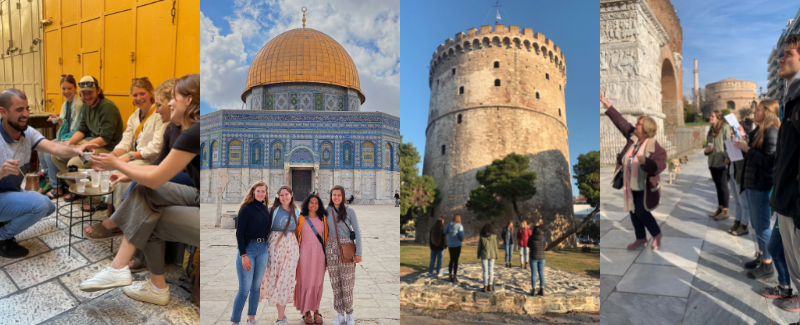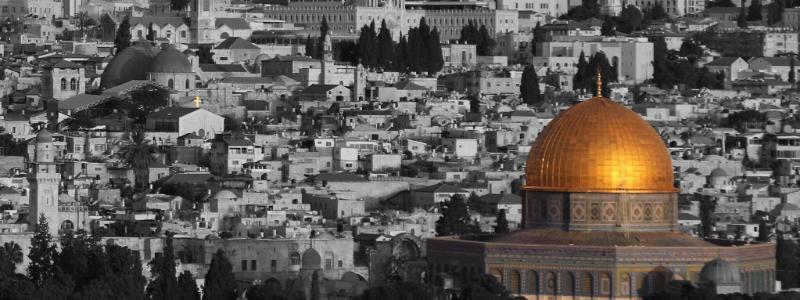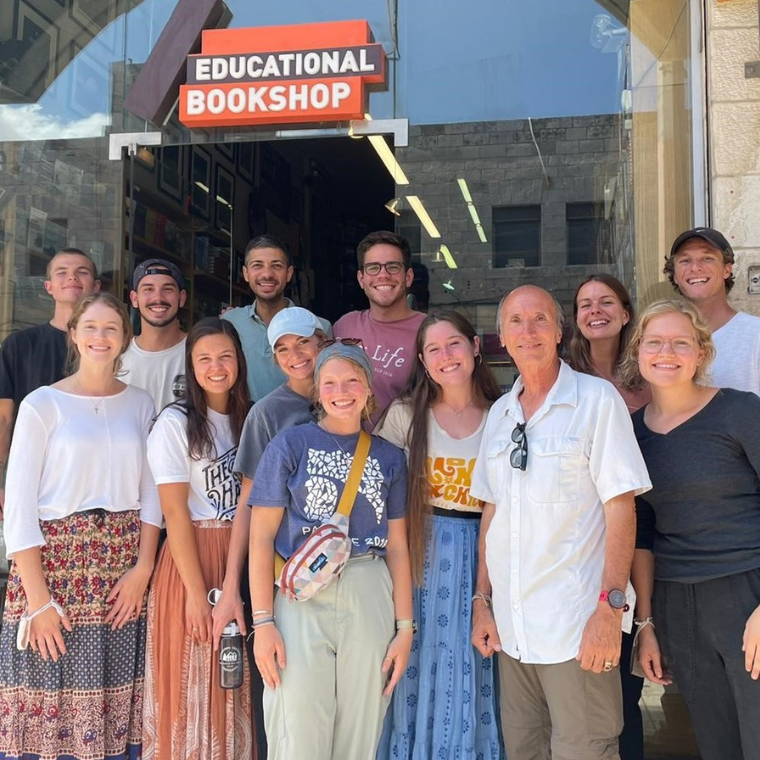Semester in Jerusalem
Engage With Ancient and Modern Narratives
A Wheaton College faculty-led semester program where students study and engage with ancient Biblical and modern Middle East narratives.

The program is:
- Inter-disciplinary—course credits can be applied to various majors/minors and fulfill thematic tags
- Experiential—courses include on-site field studies and excursions
- Cross cultural—meaningful engagement with local individuals and communities
- Formative—gain a deeper understanding of the beauty and complexity in the region
Location
Students reside and study at Jerusalem University College in Jerusalem, the cradle of ancient civilizations and one of the most vibrant cultural and religious communities in the world. Jerusalem has played a major role in world events for centuries—it is a city of religious and political significance. The JUC campus is nestled atop Mount Zion next to the Old City. In addition to classroom work at JUC, the program includes field studies to historical, cultural, religious, and political sites throughout Israel and (travel permitting) the West Bank territories and into Jordan.
After completing studies at JUC and if there are no travel restrictions, students conclude the program in a location with a complementary environment such as Prague, Czech Republic for the group to synthesize the semester of study and expand topics and studies of the CORE course.
Living Arrangements
With the exception of hotels and other accommodations during overnight excursions and the program extension, students live in dorm rooms at Jerusalem University College.
Requirements and Prerequisites
Students must be undergraduates in good academic and judicial standing and have at least a 2.5 GPA to participate. All program participants must complete GPS 231: Orientation to Study Abroad (2 hrs.) offered during B quad of the semester prior to the program. It is recommended (but not required) that students complete either BITH 211: OT Literature and Interpretation or BITH 213: NT Literature and Interpretation prior to the program.
Courses
Students earn 14-17 credit hours during the program. Many courses are accepted for major or minor elective credit by the related academic department(s) and some fulfill CATC thematic core tags. Courses at Jerusalem University College are taught by noted Israeli and Palestinian professors who are experts in their fields. Students also take a four-credit CORE course taught by the Wheaton College professor in residence.
Students complete the following required courses:
- GPS 306: Physical Settings of the Bible (4 credit hrs.) HP
A study of the physical features of the land of the Bible with an emphasis on the geographical elements of various regions and how geography influenced and affected aspects of biblical and extra-biblical history. Relevant archaeological, historical and biblical material is integrated into the lectures and field studies where it is correlated with the sites visited, the ancient network of roads and geographical elements of the land. - Course in the academic discipline of the program faculty leader
Each program faculty leader offers a course that weaves topics of their academic discipline into a course relevant to Israel or the region. For example, past courses offered a comprehensive study of 1) the life and journeys of the Apostle Paul or 2) political issues and complexities of modern Israel and the Middle East.
Students choose two to three electives from the following anticipated courses:
- GPS 318: Biblical Archaeology I (3 credit hrs.)
A survey of the results of archaeological investigations in the land of the Bible from proto-historical periods to the end of the Judean Monarchy. Emphasis is placed on relating archaeological finds to historical records, including the Old Testament. - GPS 311: History of Ancient Israel (3 credit hrs.)
An overview of the historical background of the Hebrew Bible/Old Testament. The focus is on the history of the land and the people of ancient Israel from their origin through the end of the Iron Age as seen within their Near Eastern environment. The course will use a combination of biblical, archaeological and historical data, emphasizing the distinct methodologies used in the study of each. - GPS 308: History of the Church in the East (3 credit hrs.)
An introduction to the history of the Christian Churches in the Middle East from the first to the seventh centuries A.D. Major Christian authors from the Second Temple to Constantine will show the common Christian basis of the churches in the Middle East, while representative Church writers from the three developing ecclesial families (Assyrian, Oriental, Chalcedonian) will reflect each Church’s significant role in the Christian mosaic in the Middle East. - GPS 312: Qumran and the Dead Sea Scrolls (3 credit hrs.)
A study of the texts and major critical issues concerning the Qumran community and the Dead Sea Scrolls, including their origin, interpretation of the Old Testament and place within the Jewish world and early Christianity. - GPS 313: History of the Jews during the Medieval and Modern Periods (3 credit hrs.)
An examination of Jewish history from the rise of Christian Europe in the fifth century AD to the present, by addressing such topics as medieval Jewish communities in Babylonia, Spain, Germany and Poland; Jewish relations with the church and crown; Jewish communal structure; modern changes such as enlightenment and emancipation; new Jewish movements and ideologies; modern anti-Semitism and the Holocaust; and Zionism and the rise of the modern state of Israel. - GPS 403: Iconographic Art in Judaism and Early Christianity (3 credit hrs.)* VPAV
A study of the art of Judaism and early Christianity in the centuries following the Second Temple period that expresses biblical and theological themes. *Course offering is subject to instructor availability and sufficient enrollment. - GPS XXX: Life and Times of Paul** (3 credit hrs.)
A narrative study of the life of Paul in Acts in light of historical, cultural and geographical backgrounds with application to Christian faith, practice, and witness. **Pending approval at Wheaton College. - GPS 316: Introduction to the Modern Middle East (3 credit hrs.)
A study of key political, cultural, and social aspects of the Middle East from the 19th century to the present, addressing topics such as Arab nationalism, Islamic fundamentalism, and Zionism. - GPS 317: Palestinian Society and Politics (3 credit hrs.) SI
A study of the socio-economic, organizational and political components of Palestinian society, with a focus on pertinent current developments. - GPS 401: Readings in Biblical Hebrew: Historical and Geographical Texts*** (3 credit hrs.)
A literary, textual and exegetical study of biblical Hebrew narrative texts that are significant for the study of historical geography. This course seeks to integrate the physical reality of the land of the Bible with the Hebrew text of the Old Testament. *** HEBR102 is a pre-requisite for this course.
Anticipated Major/Minor Elective Credits for Courses (beginning with the 2023-24 catalog*)
- GPS 306: Physical Settings of the Bible: ANTH, ARCH, BITH, GEOL
- GPS 318: Biblical Archaeology I: ARCH
- GPS 311: History of Ancient Israel: ARCH, BITH
- GPS 308: History of the Church in the East: BITH, HIST
- GPS 312: Qumran and the Dead Sea Scrolls: BITH
- GPS 313: History of the Jews during the Medieval and Modern Periods: IR/PACS, HIST
- GPS 403: Iconographic Art in Judaism and Early Christianity: ART
- GPS XXX: Life and Times of Paul: BITH (Pending review/approval at Wheaton College)
- GPS 316: Introduction to the Modern Middle East: IR/PACS
- GPS 317: Palestinian Society and Politics: ANTH, IR/PACS
- GPS 401: Readings in Biblical Hebrew - Historical and Geographical Texts: BITH
ANTH majors/minors may earn up to 6 elective credits. Physical Settings fulfills the archaeology requirement for the Anthropology major. Palestinian Society and Politics can be applied towards the Anthropology major with department permission.
Physical Settings, Biblical Archaeology I, or History of Ancient Israel can count toward fulfilling the 6-hours of the elective block in the Archaeology major. Up to six hours can be drawn from History of the Church in the East, Qumran and the Dead Sea Scrolls, or Readings in Biblical Hebrew to count toward the interdisciplinary emphasis portion of the Archaeology major.
BITH majors/minors may earn up to 9 elective credits. Physical Settings of the Bible or Biblical Archeology I count toward the archaeology requirement; History of the Church in the East counts toward the theology requirement.
IR/PSCI majors/minors and those completing the PACS Certificate Program may earn 6 elective credits by taking Intro to the Modern Middle East or Palestinian Society and Politics. In addition, History of the Jews during the Medieval and Modern Periods can fulfill the history elective requirement for the IR major.
History courses may be applied towards the History major/minor only with department approval.
*Students under a catalog year prior to the 2023-24 undergraduate catalog should use the above chart as a guide; for those students, some courses do not automatically count toward a major or minor. Students may seek approval through the departmental recommendation process (documentation should be on file prior to the start of the program).
Anticipated Semester Dates*
**The Semester in Jerusalem program is currently SUSPENDED.**
Cost
Program costs are comparable to a full-time on-campus semester at Wheaton (full semester tuition and a program fee equivalent to on-campus housing and food costs) and cover program tuition, room and board, academic excursions, and transportation within the program (surface and air). This does not cover passport or visa fees (if more than the standard fee), airfare to/from from the program, vaccinations or pre-program medical tests, field study fees for some elective courses (see course descriptions above for courses with additional field study fees), textbooks, and other personal expenses.
A $500 non-refundable deposit is collected after acceptance to the program and applied toward the program tuition fee. Financial aid is available for the program on the same basis as that of an on-campus semester when CPOS requirements are met.
Faculty Leader
Wheaton College will announce a program faculty leader when the program is slated to be offered again.
Learn More
If you have questions or would like to know more about the Semester in Jerusalem program, contact us at Semester.in.Jerusalem@wheaton.edu.
How to Apply
To apply, visit GoGlobal, Wheaton College's registration system for off-campus study and international travel, research, and internships.
Engage With Ancient and Modern Narratives
A Wheaton College faculty-led semester program where students study and engage with ancient biblical and modern Middle East narratives.

The program is:
- Inter-disciplinary—course credits can be applied to various majors/minors and fulfill thematic tags
- Experiential—courses include on-site field studies and excursions
- Cross cultural—meaningful engagement with local individuals and communities
- Formative—gain a deeper understanding of the beauty and complexity in the region
Location
Students reside and study at Jerusalem University College in Jerusalem, the cradle of ancient civilizations and one of the most vibrant cultural and religious communities in the world. Jerusalem has played a major role in world events for centuries—it is a city of religious and political significance. The JUC campus is nestled atop Mount Zion next to the Old City. In addition to classroom work at JUC, the program includes field studies to historical, cultural, religious, and political sites throughout Israel and (travel permitting) the West Bank territories and into Jordan.
Prior to studying at JUC and if there are no travel restrictions, students will begin the program in a location with a comparative environment such as Cairo, Egypt. There the program will set the stage for studying the political, cultural, and socio-economic issues in the region. If there are travel restrictions, the program will launch in an alternate location.
Living Arrangements
With the exception of hotels and other accommodations during overnight excursions, students live in dorm rooms at Jerusalem University College.
Requirements and Prerequisites
Students must be undergraduates in good academic and judicial standing and have at least a 2.5 GPA to participate. All program participants must complete GPS 231: Orientation to Study Abroad (2 hrs.) offered during B quad of the fall semester prior to the program. It is recommended (but not required) that students complete either BITH 211: OT Literature and Interpretation or BITH 213: NT Literature and Interpretation prior to the program.
Courses
Students earn 16 credit hours during the program. Many courses are accepted for major or minor elective credit by the related academic department(s) and some fulfill CATC thematic core tags. Courses at Jerusalem University College are taught by noted Israeli and Palestinian professors who are experts in their fields. Students also take a three-credit integrative course taught by the Wheaton College professor in residence.
Students complete the following required courses:
- GPS 306: Physical Settings of the Bible (4 credit hrs.) HP
A study of the physical features of the land of the Bible with an emphasis on the geographical elements of various regions and how geography influenced and affected aspects of biblical and extra-biblical history. Relevant archaeological, historical and biblical material is integrated into the lectures and field studies where it is correlated with the sites visited, the ancient network of roads and geographical elements of the land. - GPS 304: Journeys across Cultures and Societies in the Middle East (3 credit hrs.) SI
This course will bridge the historical narrative to explain modern societies in the Middle East with particular focus on religion, politics, and economics. The region will be studied broadly with dedicated special interest to the countries of Egypt and Israel/Palestine.
Students choose three electives from the following anticipated courses:
- GPS 325: Biblical Archaeology II (3 credit hrs.)
A survey of the results of archaeological investigations in the land of the Bible from the Persian, Greek, Roman, and Byzantine periods. Emphasis is placed upon relating archaeological finds to historical records, including the New Testament. - GPS 324: Cultural Backgrounds of the Bible (3 credit hrs.)
An analysis of various aspects of life in biblical times to provide focal points to help the student understand biblical customs and ways of thought more accurately. The course includes a required six-day field study to Bedouin areas in Jordan, concluding May 8th. The field study fee ($1,765.00) is NOT included or covered by the SiJ program fees; students are responsible for the additional fee. - GPS 326: History of the of the Second Temple Period (3 credit hrs.)
An overview of the history of ancient Israel during the formative period of both Judaism and Christianity. It also provides a background to the Apocrypha and the New Testament. The course will use a combination of biblical, archaeological and historical data, emphasizing the distinct methodologies used in the study of each. The course includes a field study fee ($540.00) which is NOT included or covered by the SiJ program fees; students are responsible for the additional fee. - GPS 327: Hermeneutics of OT Texts in Jewish and Christian Tradition (3 credit hrs.)
A comparative study of hermeneutical methods for reading the Hebrew Bible / Old Testament in early Jewish and Christian tradition. - GPS 328: The Parables of Jesus and Rabbinic Meshalim (3 credit hrs.)
A seminar study of the parables of the Gospels and the Meshalim (Rabbinic parables) found in classical rabbinic literature, including issues of hermeneutics, methodology of approach, and content. - GPS 403: Iconographic Art in Judaism and Early Christianity (3 credit hrs.) VPAV
A study of the art of Judaism and early Christianity in the centuries following the Second Temple period that expresses biblical and theological themes. - GPS 331: Jewish Thought and Practice (3 credit hrs.)
The course will describe the nature of present-day Jewish religious beliefs, books, and practices with an emphasis on their development throughout the ages. - GPS 323: Islamic Thought and Practice (3 credit hrs.)
This course introduces the religion and history of Islam from the time of the Prophet Muhammad (7th century AD) until today, with an emphasis on the development of basic themes and trends which are a part of Islam today. - GPS 319: Society and Politics in the Holy Land: Palestinian and Israeli Perspectives (3 credit hrs.) GP
The course will examine central historical, social and political issues as these relate to Israeli and Palestinian societies. Course topics will be covered alternately by both an Israeli and a Palestinian professor, long associated with Jerusalem University College. The final class, taught jointly, will examine each side's positions and expectations regarding present realities and future prospects for peace and reconciliation. - GPS 332: Historical and Social Settings of Modern Israel (3 credit hrs.)
An examination of historical, social and political aspects of contemporary Israeli society, including the ideologies and groups that have played a major role in the formation of Israeli society. Emphasis is placed on social and political issues which are at the center of current debate in the country. The course includes a field study fee ($565.00) which is NOT included or covered by the SiJ program fees; students are responsible for the additional fee.
Anticipated Major/Minor Elective Credits for Courses (beginning with the 2023-24 catalog*)
- GPS 306: Physical Settings of the Bible: ANTH, ARCH, BITH, GEOL
- GPS 319: Society and Politics in the Holy Land: ANTH, IR/PSCI, PACS
- GPS 325: Biblical Archaeology II: ARCH, BITH
- GPS 324: Cultural Backgrounds of the Bible: ARCH, BITH
- GPS 326: History of the Second Temple Period: ARCH, BITH
- GPS 327: Hermeneutics of OT Texts in Jewish and Christian Tradition: ARCH, BITH
- GPS 328: The Parables of Jesus and Rabbinic Meshalim: ARCH, BITH
- GPS 403: Iconographic Art in Judaism and Early Christianity: ART
- GPS 331: Jewish Thought and Practice: IR/PSCI, PACS, PPE, PHIL
- GPS 323: Islamic Thought and Practice: IR/PSCI, PACS, PPE, PHIL
- GPS 332: Historical and Social Settings of Modern Israel: IR/PSCI, PACS
ANTH majors/minors may earn up to 6 elective credits. Physical Settings fulfills the archaeology requirement for the Anthropology major. Society and Politics in the Holy Land can be applied towards the Anthropology major with department permission.
Physical Settings, Biblical Archaeology II, History of the Second Temple Period, or Cultural Backgrounds can count toward fulfilling the 6-hours of the elective block in the Archaeology major. Either Biblical Archaeology II or History of the Second Temple can count toward the core requirement curricular slot currently occupied by ARCH 345. Up to six hours can be drawn from Cultural Backgrounds, Hermeneutics of OT Texts, or The Parables of Jesus to count toward the interdisciplinary emphasis portion of the Archaeology major.
BITH majors/minors may earn up to 9 elective credits. Physical Settings of the Bible, Biblical Archeology II, History of the Second Temple, or Cultural Backgrounds count toward the archaeology requirement.
IR/PSCI majors/minors may earn up to 6 elective credits by taking Society and Politics in the Holy Land, Jewish Thought and Practice, Islamic Thought and Practice, or Historical and Social Settings of Modern Israel. Those completing the PACS Certificate may apply any of the four courses toward the certificate.
Jewish Thought and Practice and Islamic Thought and Practice may be applied to the PPE Certificate as elective courses from the Philosophy discipline.
Philosophy majors/minors may earn 3 elective credits by taking Jewish Thought and Practice or Islamic Thought and Practice.
History of the Second Temple Period may be applied towards the History major/minor with department approval (pending approval).
*Students under a catalog year prior to the 2023-24 undergraduate catalog should use the above chart as a guide; for those students, some courses do not automatically count toward a major or minor. Students may seek approval through the departmental recommendation process (documentation should be on file prior to the start of the program).
Anticipated Semester Dates*
January 8 –May 3, 2024 (*Program dates are tentative and contingent on sufficient enrollment)
Cost
Program costs are equivalent to a full-time on-campus semester at Wheaton (full tuition; double/triple dorm room; full board-18 AYCE meal plan) and cover program tuition, room and board, academic excursions, and transportation within the program (surface and air). This does not cover passport or visa fees (if more than the standard fee), airfare to/from from the program, vaccinations or pre-program medical tests, field study fees for some elective courses (see course descriptions above for courses with additional field study fees), textbooks, and other personal expenses.
A $500 non-refundable deposit is collected after acceptance to the program and applied toward the program tuition fee. Financial aid is available for the program on the same basis as that of an on-campus semester when CPOS requirements are met.
Faculty Leader for Spring 2024
Dr. Timothy Taylor, Associate Professor of International Relations
 I am thrilled to have the opportunity to share this semester study experience with students by serving as the faculty leader for Wheaton’s Semester in Jerusalem program in Spring 2024. I am a graduate of Taylor University, completed my PhD in 2016, and then joined the faculty at Wheaton College where I am currently an Associate Professor of International Relations. I have loved teaching a variety of classes in the International Relations major and the Politics, Philosophy, and Economics (PPE) certificate.
I am thrilled to have the opportunity to share this semester study experience with students by serving as the faculty leader for Wheaton’s Semester in Jerusalem program in Spring 2024. I am a graduate of Taylor University, completed my PhD in 2016, and then joined the faculty at Wheaton College where I am currently an Associate Professor of International Relations. I have loved teaching a variety of classes in the International Relations major and the Politics, Philosophy, and Economics (PPE) certificate.
I will be joined by my wife, Kim, and our four children. After graduating from Taylor University, we lived and taught in the Philippines for two years. I also studied in the Middle East as an undergraduate student in the fall semester of my junior year. Having the opportunity to live in Cairo, Egypt and travel extensively across Israel, Syria, and Lebanon were transformative for my Christian faith, education, and what led to my career in International Relations. I cannot wait to join students on what will be a lifetime opportunity of transformation, growth, and friendship.
Please email using the contact information below if you have questions about the program and I would be delighted to schedule a time for us to meet. My wife and I have thoroughly enjoyed living near campus and forming meaningful relationships with Wheaton students. We look forward to being part of the Wheaton community in Jerusalem.
Learn More
If you have questions or would like to know more about the Semester in Jerusalem program, contact us at Semester.in.Jerusalem@wheaton.edu.
How to Apply
To apply, visit GoGlobal, Wheaton College's registration system for off-campus study and international travel, research, and internships.
The application for the spring 2024 cohort is CLOSED.

